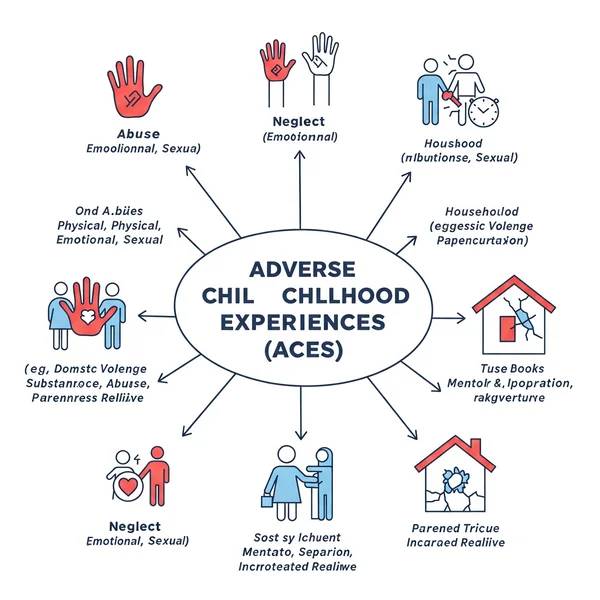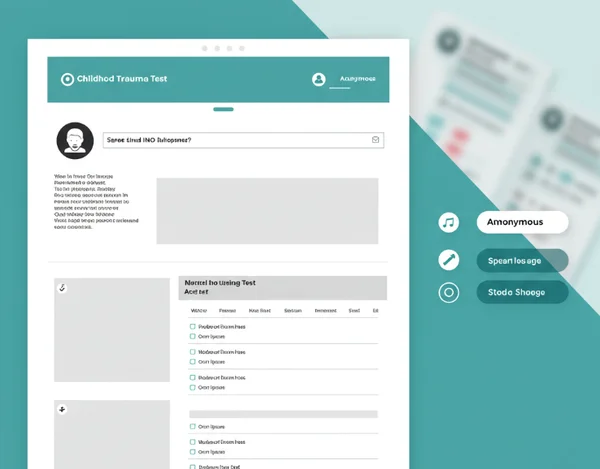ACEs & Childhood Trauma Test Insights
May 10, 2025 | By Nora Hayes
Do you ever wonder if experiences from your early years are still shaping your life today? Many adults carry the unseen weight of their past, often without fully realizing how these formative events influence their current well-being, relationships, and reactions. What are Adverse Childhood Experiences (ACEs)? Understanding this crucial concept, and how a childhood trauma test can illuminate its potential impact, is the first step towards deeper self-awareness and healing. If you're looking to understand your past better, consider taking our free ACEs test.

What are Adverse Childhood Experiences?
How does childhood trauma affect adults? Adverse Childhood Experiences (ACEs) refer to a range of potentially traumatic events that occur in childhood (0-17 years). These aren't just fleeting "bad memories"; they are significant stressors that can disrupt a child's development and have lasting effects. Our ACEs test is designed to help you reflect on these experiences.
More Than Just "Bad Memories"
The term ACEs encompasses experiences that can undermine a child's sense of safety, stability, and bonding. These can include various forms of abuse, neglect, and household challenges. Recognizing these as significant events is vital because they can fundamentally alter a child's developing brain and stress response systems. Understanding the scope of adverse childhood experiences helps in acknowledging their potential severity.
Common Categories of ACEs (Abuse, Neglect, Household Dysfunction)
The original ACEs study identified ten primary categories, though the concept has since expanded. These typically fall into three main groups:
-
Abuse: Physical, emotional, or sexual abuse.
-
Neglect: Physical or emotional neglect.
-
Household Dysfunction: Witnessing domestic violence, substance abuse in the household, mental illness in the household, parental separation or divorce, or an incarcerated household member. Each of these experiences can contribute to a person's ACE score.

Why Understanding Your ACE Score Matters for Adult Well-being
What is an ACE score? An ACE score is a tally of the different types of ACEs a person reports experiencing. Research, like the landmark CDC-Kaiser Permanente ACEs study, has shown a strong, graded dose-response relationship between ACEs and numerous health, social, and behavioral problems throughout a person's lifespan. A higher ACE score is often linked to an increased risk of developing certain physical and mental health conditions. This is why an ACE assessment can be a valuable tool for self-reflection.
The Long-Term Impact of Childhood Trauma & High ACE Scores
The effects of childhood trauma and high ACE scores can ripple through an individual's life, often manifesting in ways that aren't immediately connected to early experiences. What are the long term effects of childhood trauma?
Physical Health Consequences Linked to ACEs
Studies have linked higher ACE scores to an increased risk for chronic physical health conditions in adulthood. These can include heart disease, stroke, cancer, chronic obstructive pulmonary disease (COPD), diabetes, and obesity. The chronic stress experienced during childhood can lead to long-term physiological changes that predispose individuals to these conditions.
Mental Health Challenges: Anxiety, Depression, and Trauma Symptoms
Unresolved childhood trauma is a significant risk factor for various mental health challenges. Adults with high ACEs are more likely to experience:
- Depression
- Anxiety disorders
- Post-Traumatic Stress Disorder (PTSD) or Complex PTSD (CPTSD)
- Substance use disorders
- Suicidal ideation Many of these trauma symptoms can be explored through a comprehensive trauma test.
Relational Patterns and Social Difficulties
Early experiences shape our attachment styles and ability to form healthy relationships. Childhood trauma can lead to difficulties with trust, intimacy, setting boundaries, and navigating social situations. Individuals might find themselves repeating unhealthy relational patterns or struggling with feelings of isolation. Recognizing these patterns is a key step in healing childhood trauma.
How Our Free Childhood Trauma Test Can Provide Clarity
If you're wondering about the impact of your early years, our free childhood trauma test can be a helpful starting point. This ACEs test is designed to help you reflect on potential adverse childhood experiences in a confidential and non-judgmental way.

What to Expect from the ACEs Test Questions
The questions in our childhood trauma questionnaire are based on the categories of experiences identified in ACEs research. They are designed to prompt reflection on various aspects of your childhood environment and relationships. How do you get tested for trauma related to childhood? Our online tool offers an accessible first step.
Interpreting Your Childhood Trauma Test Results: A Starting Point
After completing the ACEs test, you'll receive an ACE score and some general information about what these scores might indicate. It's vital to remember that this score from an online trauma assessment is not a diagnosis. It's a tool for self-awareness, a starting point for understanding potential risk factors and areas for further exploration.
Anonymity and Confidentiality: Taking the Test Safely
We understand the sensitive nature of this information. Our free childhood trauma test is designed to be anonymous and confidential, allowing you to explore these personal questions in a safe space. You can take the childhood trauma test now with peace of mind.
What To Do After Your ACEs & Trauma Test
Receiving your ACE score from the childhood trauma test can be an enlightening, and sometimes emotional, experience. The next step is to consider what this information means for you and how you can move forward.
Self-Compassion and Validating Your Experiences
Regardless of your ACE score, remember that your experiences are valid. Practice self-compassion. Acknowledging the impact of adverse childhood experiences is not about blame, but about understanding and fostering kindness towards yourself.
Exploring Further Resources and Information
Learning more about ACEs and their impact can be empowering. There are many reputable resources available online and in libraries. Understanding the science behind childhood trauma can help demystify your experiences.
When to Consider Professional Support for Childhood Trauma
If your ACEs test results are concerning, or if you recognize ongoing trauma symptoms that affect your daily life, seeking professional support is a courageous and beneficial step. A therapist specializing in trauma can help you process past experiences, develop healthy coping mechanisms, and work towards healing childhood trauma. A trauma test can be a good starting point to discuss with a professional.

Understand Your Past, Empower Your Future: Take the ACEs Test Today
Your past doesn't have to define your future. By understanding the potential impact of adverse childhood experiences through tools like our childhood trauma test, you can gain valuable insights that empower you to make positive changes. This knowledge can be the key to unlocking new paths for healing, growth, and building a more fulfilling life.
Are you ready to explore how your early experiences might be influencing you today? Take our free ACEs test now and begin your journey of self-discovery.
What are your thoughts on the importance of understanding childhood experiences for adult well-being? Share your general reflections in the comments below – your insights could help others on their own paths.
Childhood Trauma & ACEs Test: Common Questions
-
What does a high ACE score mean for my health?
A high ACE score indicates exposure to multiple types of adverse childhood experiences, which research has linked to an increased risk of various physical and mental health problems in adulthood. However, it's a risk factor, not a destiny. Many people with high ACE scores lead healthy, fulfilling lives, often through resilience and support. The ACEs test available on our site can provide an initial indication.
-
Is the childhood trauma test on TraumaTest.org accurate?
Our childhood trauma test (or ACEs test) is designed as a screening tool based on established ACEs research. It provides an "ACE score" based on your self-reported experiences. While it's a valuable tool for self-reflection and identifying potential areas of concern, it is not a clinical diagnostic instrument. For an "accurate" diagnosis of any trauma-related condition, a professional evaluation is necessary.
-
Can I heal from adverse childhood experiences?
Yes, healing from adverse childhood experiences and their impact is possible. While the experiences themselves cannot be changed, individuals can learn to process the trauma, develop healthier coping strategies, build resilience, and reduce the long term effects of childhood trauma. Therapy, support groups, and self-care practices can be very effective.
-
How is the ACEs test different from a general trauma test?
A general trauma test might cover a broader range of traumatic events that can occur at any point in life. An ACEs test or childhood trauma test specifically focuses on a defined set of potentially traumatic experiences that occur before the age of 18. Both can provide valuable insights, but the ACEs test is more targeted towards early life adversity.
-
Where can I find more information about ACEs and their impact?
Authoritative sources like the Centers for Disease Control and Prevention (CDC) website on ACEs, the World Health Organization (WHO), and reputable mental health organizations offer extensive information on adverse childhood experiences, their impact, and resources for support. Our blog at TraumaTest.org also aims to provide helpful articles on these topics.